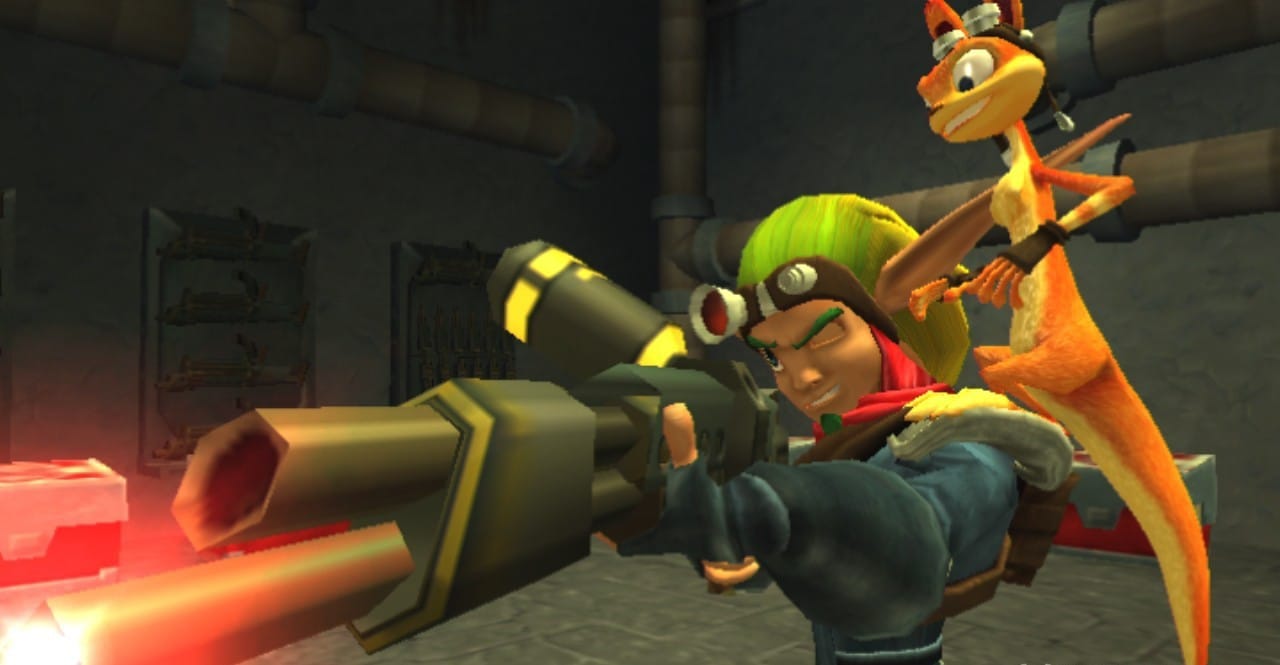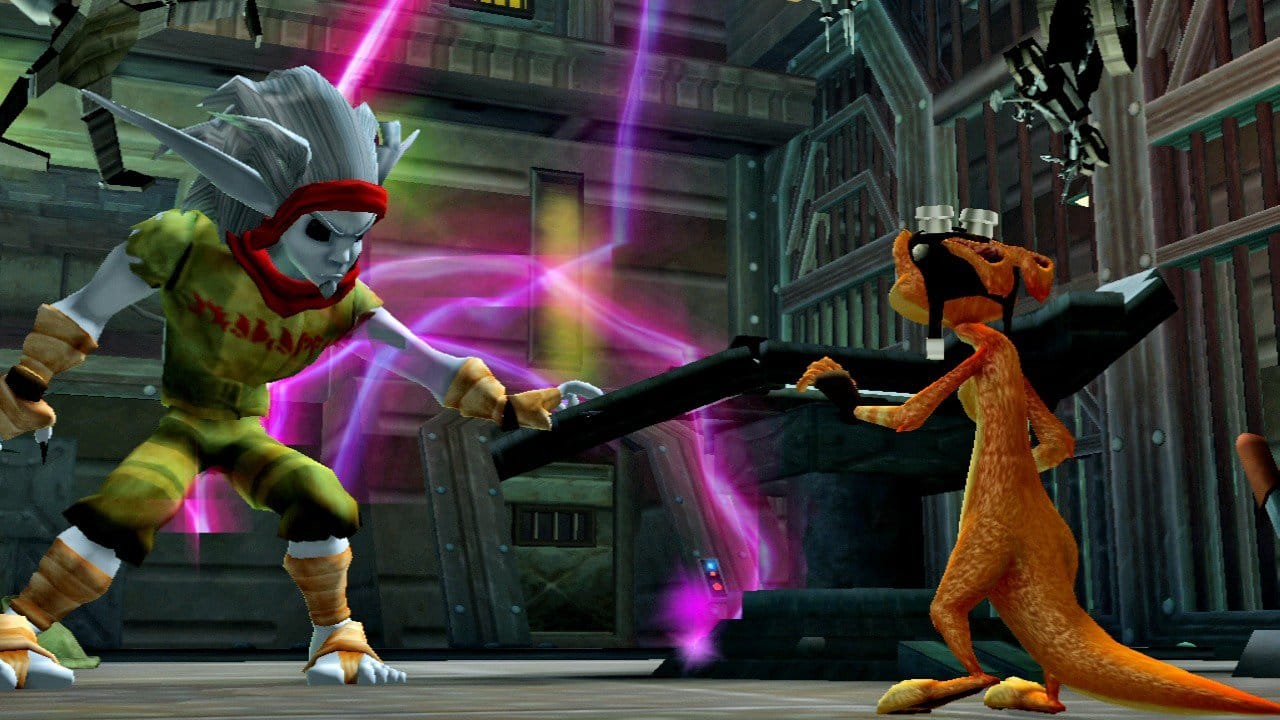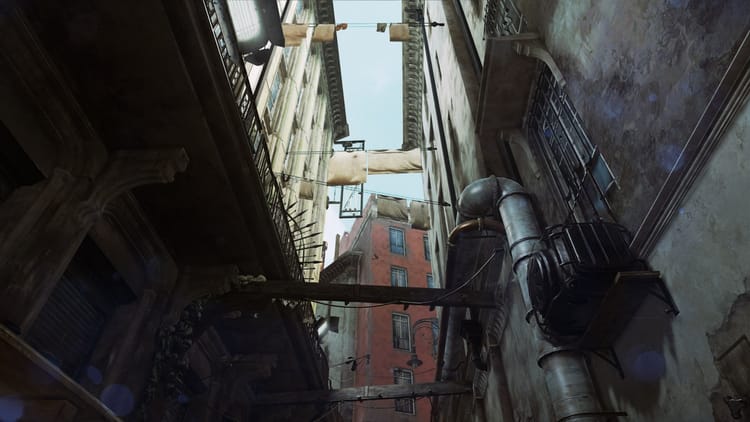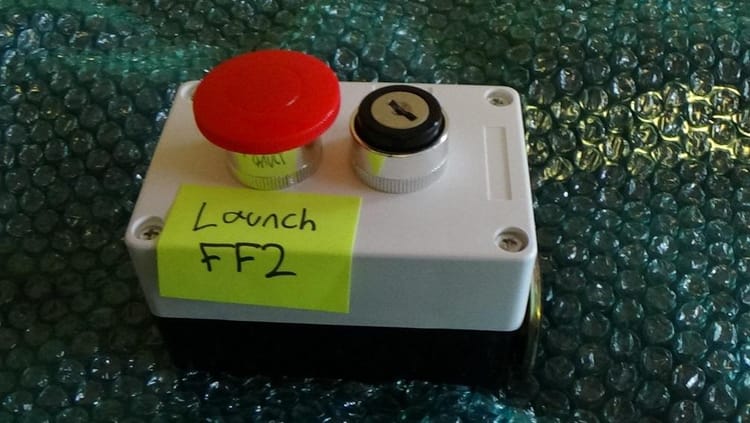Jak and Daxter: the Search for Player Two

This article is part of PS2 Week, a full week celebrating the 2000 PlayStation 2 console. To see other articles, go here.
///
I hear him pad up next to me before I feel his whiskers tickle my ankles. A wet, impatient nudge tells me to hurry up already—there’s something I should see up ahead.
Won over, I look down. “What is it, Dax?”
His ears perk at my response before immediately shooting down to the ground with the rest of his body. Head low, eyes steady, he slinks forward to his new objective with laser focus. But, after reaching a bend in our path, he pauses.
A golden retriever tears out of some nearby bushes, a maniacal, blurry ball of yellow fur flying across my vision. Just like that, the tension melts from Dax’s body, instantly replaced by the prance of a baby goat. Before I can even think of telling him to stay, he’s off—all bow-legged limbs and effort, but with very little to show for it.
I know calling him back now will be pointless. I know he’ll run his heart out to catch that golden retriever and I know he’ll fail, either by tripping over himself, crashing into a tree, or some other form of physical ineptness. He’ll fail, and come sauntering back to me, head held high, like I can thank him later for doing all the hard work of saving the day.

“You’re really something, Daxter,” I say, shaking my head, petting him despite myself. His only response is a full-toothed grin overflowing with slobber.
///
I was a weird kid. People didn’t seem to like me much and I didn’t like them either. I preferred fictional, computer-generated, and four-legged company to most human interaction. The complexity of people—with all their subtext and hints and the ever-present threat of a faux pas—paralyzed me. So instead of the living thing, I studied the human experience in the controlled environment of books and games and my own mind. Fiction was less of a fancy and more like my social life; the stories they told and that I invented serving as friends, boyfriends, mentors.
I did have a few real life girl friends for the occasional playdate or recess, but it was by no coincidence that all those girls had older brothers with videogame consoles. I wasn’t allowed to play games at home, so all my early gaming experiences were strictly covert operations.
“Is your brother home?” so often became the first words out of my mouth when I went over a friend’s house that I started to worry they’d find me out and stop inviting me. So I forced myself to make small talk for at least three minutes before broaching the possible availability of the GameCube and Super Smash Bros. Melee (2001) disc that needed to come with it.
how much he’d love a girl who could beat him at videogames (boys loved that, right?)
But, sensing how unsatisfying my version of small talk was, I decided to figure out some other way of earning my keep to play games. Too quickly, my attention turned to the owners of these beloved consoles: the mythical Teen Older Brother Gamer, who I scarcely knew but whose presence always decorated my gaming spaces. Discarded sweatpants, half-eaten bags of Doritos, a stack of blank CDs and mixtapes with lewd titles like “Summer Shit” and “Got my license homos.” I wondered—probably more than I should—about the creatures that inhabited these rooms when I wasn’t there. Did they know we lay on their beds for hours, giggling and gossiping? Would they blush to hear their names come up when we played MASH? Could they even imagine how #ready #my #body was for our inevitable coupling?
Without the mythical Teen Older Brother Gamer, I would never have gotten my gaming fix all those years ago. Without them, I might’ve never gotten the opportunity to love games at all. But above even the joy of playing, the mythical Teen Older Brother Gamer of my childhood gave me the gift of a daydream (a hot commodity to 10-year-old me). I imagined our beautiful gaming marriage together: how he’d give me a run for my undefeated championship in Super Smash Bros.—how much he’d love a girl who could beat him at videogames (boys loved that, right?). To my excitement and horror, the day came when I met a legend. Midway through a Super Smash Bros. match, one of the Teen Older Brother Gamers walked through the bedroom door and out of my fantasy life. He had braces, referenced Wayne’s World (1992) a lot, and smelled… stale. I can’t remember if we interacted directly at all, but doubt it. I do remember this weird tingly, empty feeling finding its way into my gut that hasn’t gone away since. I couldn’t open my mouth or make my vocal cords work. So instead, he opened the GameCube disc drive to remove our game, ignoring his sister’s shrill protests and silently replacing it with Madden. Then, after a few minutes of watching him shout obscenities at a virtual football team, he farted in his sister’s face, which caused them to get into a fight, which caused him to yell at her to leave his room, which caused my friend to eject herself from his room crying. Which caused the abrupt end to our relationship.

In the end, the Teen Older Brother Gamer taught me the most valuable lesson of all, though: that the real thing never lives up to the fantasy.
///
It wasn’t just the mythical older brother, either. Throughout almost all my formative gaming experiences, a dude stood as gatekeeper.
A little later, my sister’s considerate high school boyfriend would give me his old Nintendo 64 after deciding he was “too mature” for it. Much later, when I myself was in high school, I would rediscover my love of games with my boyfriend and his own rat pack of Teen Older Brother Gamers. With the status of Girlfriend, I found myself accepted by that gaming community for the first time as a non-sexual entity. Until the invitation was promptly rescinded upon our break up.
But I’m getting ahead of myself. Because before all that, there was the PlayStation 2. The first console I ever owned myself: the symbol of my victory over my mother’s strict gaming ban, and the forces that made gaming so inaccessible to young girls.
a dude stood as gatekeeper
My PS2 came at a cost, though, as most great victories do. My mom only agreed to buy it for me as a consolation prize for not getting me what I really wanted—what I’d been begging for every Christmas and birthday since I learned how to talk. I wanted a dog. I didn’t want a puppy. I didn’t want a cat. I didn’t want a stuffed animal thrown into a gift box that we inevitably threw out along with the Christmas tree. I wanted a dog.
I wanted a companion.
One time, I was so devastated by the biannual dog battle with my mom (after taking it upon myself to do extra chores for weeks around the house to demonstrate how responsible I was), I staged a literal hunger strike in protest. My parents did their best to not negotiate with 12-year-old terrorists, but a few days and pounds lost later, their resolve waned. We bargained one rule for another rule. I couldn’t have a dog. But how about a PS2?
///
Jak and Daxter (2001) wasn’t the first game I played on my PS2, but the series defined my relationship to that console—and games as a whole. I returned to them, again and again, like you would a best friend, in need of someone who understood without you having to say a word. Like every other early teen who owned a PS2, I grew up with the Jak series in the literal sense of the word. We matured together: our first chapters idyllic and simple; the second chapter a brooding mixture of anger and sexuality; our third chapter more nebulous, ill-defined, and undetermined than all the rest. As Jak was pumped with Dark Eco and the series took a turn away from boyhood, I too started to feel the effects of a new chemical as it coursed through my body, telling me to fight and/or fuck everything in sight.

It’s hard to reconcile with the knowledge that one of your formative teenage experiences was the result of a Sony executive liking the idea of “growing with your audience.” And, granted, for all the timeless aspects of the Jak series, its treatment of women betrays its age in a way that you can’t help but wince at. But the truth is that I only started seeing myself in Jak when the childhood drained from his eyes, only to be replaced by the deep, pulsating thirst for violence that was Jak II (2003). I fell in love with him as he struggled to cope with the uninhabitable, colorless world he suddenly found himself in after the rose-tinted glasses of childhood had been unceremoniously shattered. I understood the impossibility of his return home, and how it was time instead of distance that made going back hopeless.
Like all the male videogame protagonists I loved during my teen years (for there were many), I wanted to be Jak as much as I wanted to date him. Coincidentally, I ended up finding the companionship I needed in my PS2 after all. Not only through my love of Jak, videogames, and play, but also in the male camaraderie between the game’s titular characters. Jak and Daxter encapsulated the relationship I had been fantasizing about since the days of sweatpants and Doritos. I still longed for the loyalty and mutual respect that came with waging war and fucking shit up along side each other. To me, it seemed the essence of this era in gaming—Ratchet & Clank (2002), Banjo-Kazooie (1998)—and the friendships born out of playing them together. I saw glimpses of this camaraderie in the non-videogame play experiences I shared with female friends. Yet those relationships, while immensely powerful and affecting in their own ways, felt more complex, layered as they always are by the trauma of being a young girl in a society built predominantly to accommodate adult men. Girlhood play, though just as savage and raw, never felt the same as what I saw in the movies and commercials where boys were boys and talked shit on each other to show affection.
a secret part of me clung to the promise of belonging
I will never know whether my concept of male camaraderie is something that exists only in the games and coming-of-age media I consume or whether it speaks to actual real-life experiences. Part of me recognizes the familiar vagueness of a beloved fantasy; that warm, uncomplicated kind of comfort that comes with longing for something your mind controls. An even bigger part of me has come to understand how the male power fantasy shaped almost every game from this time period—God of War (2005), Hitman (2000), Prince of Persia (2003)—giving maleness the pedestal from which a player gazes down upon a world created exclusively to entertain, excite, and embolden his ego.
But still, I clung to the promise of belonging for much longer than I should have. I never really gave up the search for my Player Two: that partner in crime who looks at you with equal amounts challenge and encouragement. I’ve been chasing the fantasy of male camaraderie, unwittingly, ever since most of my youth was defined by videogames about being a dude doing dude stuff with other dudes. I can look back at it all now and see how the desire for it led me to make terrible life decisions, one after the other, most of them men.
But after graduating college—during that immutable time when you learn to shed the skin you thought you wanted—I finally made the first good decision inspired by my doomed quest for male camaraderie. I adopted a dog. I named him Dax.
///

I won’t drag you through the finer details of why my dog is the awesomest (at least not here). But one thing you need to know about Dax is that he understands rejection and isolation like few others do. After five months of a tortured early life, he was discarded at the local ACCT—half dead, all bones, covered in his own shit, with a clipped ear and a misshapen spine—and it was clear he had been left for dead in a cage for quite some time.
But what makes Dax special isn’t his trauma (that’s pretty standard for a shelter dog and doesn’t define any of them). What drew me to Dax was actually his unbreakable, unadulterated, unquenchable love of play. If someone can love playing to a dangerous extent, that would be Dax. He will almost literally die before he stops playing. He’d rather die. I’ve seen this dog—all 45 pounds of mutt—run full sprint toward a grown Great Dane he had never met before, forgetting in his excitement that they would eventually collide if he didn’t slow down, until the last second when he made the questionable decision to attempt to jump over the eight-foot-tall dog, only to wind up body slamming into a nearby tree trunk… before getting up and trotting off like nothing happened.
Early on, I realized Dax was not a normal player at the dog park. The lack of socialization in his first few months of life had turned him into something of a loser, slow to pick up on social cues and unable to contain his fervent excitement at being alive and not in a cage. He demonstrated an almost concerning level of commitment to fun and games, which other dogs found odd or at the very least annoying. Many dogs don’t like Dax. But what I admire most about him is that he doesn’t seem to notice. Or mind. His social ineptness doesn’t make him so ashamed that he hides away from the world. If anything, Dax finds a way of being more insufferably himself the more someone rejects him, winning over the crowd with sheer persistence.
This power fantasy has real-world victims
For all his incredible qualities, Dax is not a necessarily easy dog. His over-excitement can cause a small ruckus everywhere we go at the park as he prances off, oblivious. His early isolation and obsession with play make him a liability out in the real world. A liability I had to address. When I started dog training, I realized that most trainers teach owners to view their pets as living objects that must accommodate their needs. The presumptions of patriarchy are oddly embedded in the human understanding of dog behavior. Dominance training, the most widely practiced theory promoted by supposed experts like Cesar Millan, twists dog behavior to fit the underlying assumptions of machismo and human superiority. Your dog jumps on you to lick your face? That’s a dominance play and you must physically assert yourself over your dog in order to earn their respect and ensure they won’t do it again, according to dominance training. Meanwhile, back in reality, it’s safe to assume your dog is genuinely excited to see you, and keeps jumping on you because they love kissing your face. At the end of the day, pack mentality (and the dominance training theory that stems from it) was invented by one guy in 1947 who didn’t even study wolves in the wild. The biases of patriarchy, the language of masculinity, lead us to wrongfully impose the concept of pack hierarchy (alpha, beta, gamma) onto wolves and dogs for decades. Only now experts debate whether it even exists.
Dog may be man’s best friend, but man has proven to be the scourge of canine existence. Throughout modern history, we’ve played god with the species, over-breeding them into genetic mutations with significantly worse lifespans and quality of life purely for our amusement. At the heart of our misguided relationship to dogs is another kind of seductive power fantasy, where owners can derive a false sense of superiority by domineering creatures who trust and depend on them the most. Unlike power fantasies in videogames, though, this one has real-world victims, like the millions of dogs left to starve in their cages each year in the U.S. because they were “too stubborn” (read: too autonomous) to accommodate their owner’s ego. Pitbulls (or the dogs commonly misidentified as pitbulls) suffer the most from this intersection of hyper-masculinity and dog ownership, not only making up the largest percentage of shelter dogs but also 40% of those euthanized. The pitbull’s unfounded reputation for viciousness tends to attract the worst kind of owners: those who want a dog to demonstrate how tough and manly they are. Bad owners have left their scars on this otherwise loyal, intelligent, and gentle breed. Not only physical scars, but the scars of perpetual neglect and stigma. Yet, somehow, the breed we project our most dangerous concepts of masculinity onto—the ones we breed for the pits we build to force them to fight one another for our amusement—still aren’t broken or ruined by human depravity, trusting us enough to become faithful companions when given the chance. We abuse pitbulls time and time again and, to their detriment, they never stop hoping for the human hero who can reciprocate the lifelong loyalty they have to offer.

Dax had already suffered through the hell of one human ego. So instead, I opted for force-free positive-reinforcement training, which preaches learning through the fun of meeting challenges together. Force-free training makes the ludicrous assumption that dogs will listen and love you more if treated as an equal. Training becomes a game you both play, rewarding good communication and mutual understanding, while saying “we’ll get it next time” whenever there’s a Game Over screen. As two dedicated yet different kinds of players, Dax and I get on just fine that way. In fact, Dax excels in every category, eyes trained on me with that determined focus, only his tail betraying the fervent need to pass our mission with flying colors and beat his high score.
///
What sets Jak and Daxter apart from other classic gaming duos like Ratchet and Clank is how they share the spotlight instead of playing either first or second fiddle. “Behind every great hero is an obnoxious nincompoop,” says the old sage Samos at the beginning of Daxter’s own beloved spin-off PSP title from 2006. The journey that follows shows Daxter fighting tooth-and-nail to save Jak from imprisonment. By the end of the game, you’re left to wonder: who is the hero and who is the sidekick of this story? Taking turns in saving one another; it’s hard to tell with Jak and Dax. It’s hard to tell with Dax and me. Because Jak and I, we share the title of protagonist with our furry companions. Or, at the very least, the role of “obnoxious nincompoop” remains interchangeable between us. Sure, Daxter might be all charm and zero social aptitude, all confidence and no competence. He might be impulsive, and quick to land us in more trouble than when we started.
But Jak and I are the ones too self-conscious and hot-blooded to even speak. Avoiding contact, we prefer isolation to the possibility of vulnerability. The biggest revelation of Jak 3 (2004) was not the glaringly obvious “twist” at the end that the benevolent leader the duo had been following throughout the game was actually Jak’s father. No, Jak 3 flipped the entire hero-sidekick script on its head by revealing that the most powerful beings in the series, the Precursors, were not pointy-eared humans, but instead fuzzy orange Ottsels like Daxter.
the PS2 was more than a gaming console. It was my autonomy.
To me, the PS2 was much more than a gaming console. It was my autonomy. Able to play whenever I wanted and whatever I wanted, I began to develop a relationship to games on my own terms. Though still limited by the pervasive male power fantasy, I came to see myself in gaming’s greatest heroes, for better and worse.
Of course, the real thing never lives up to the fantasy. The fantasy is a fantasy because it is inherently unattainable, relying on the distance of an outsider gazing in on perfection. Letting a fantasy die isn’t all that bad, either. Often, the reality is endlessly more complicated and engaging, forcing you to face challenges that give just rewards if you work hard enough to earn them.
I look down again at my Player Two. He’s several feet away from me, trying to dig up a large insect, butt high up in the air in a classic “play bow” position.
“He doesn’t want to play with you, Dax,” I sigh.
He couldn’t care less.



